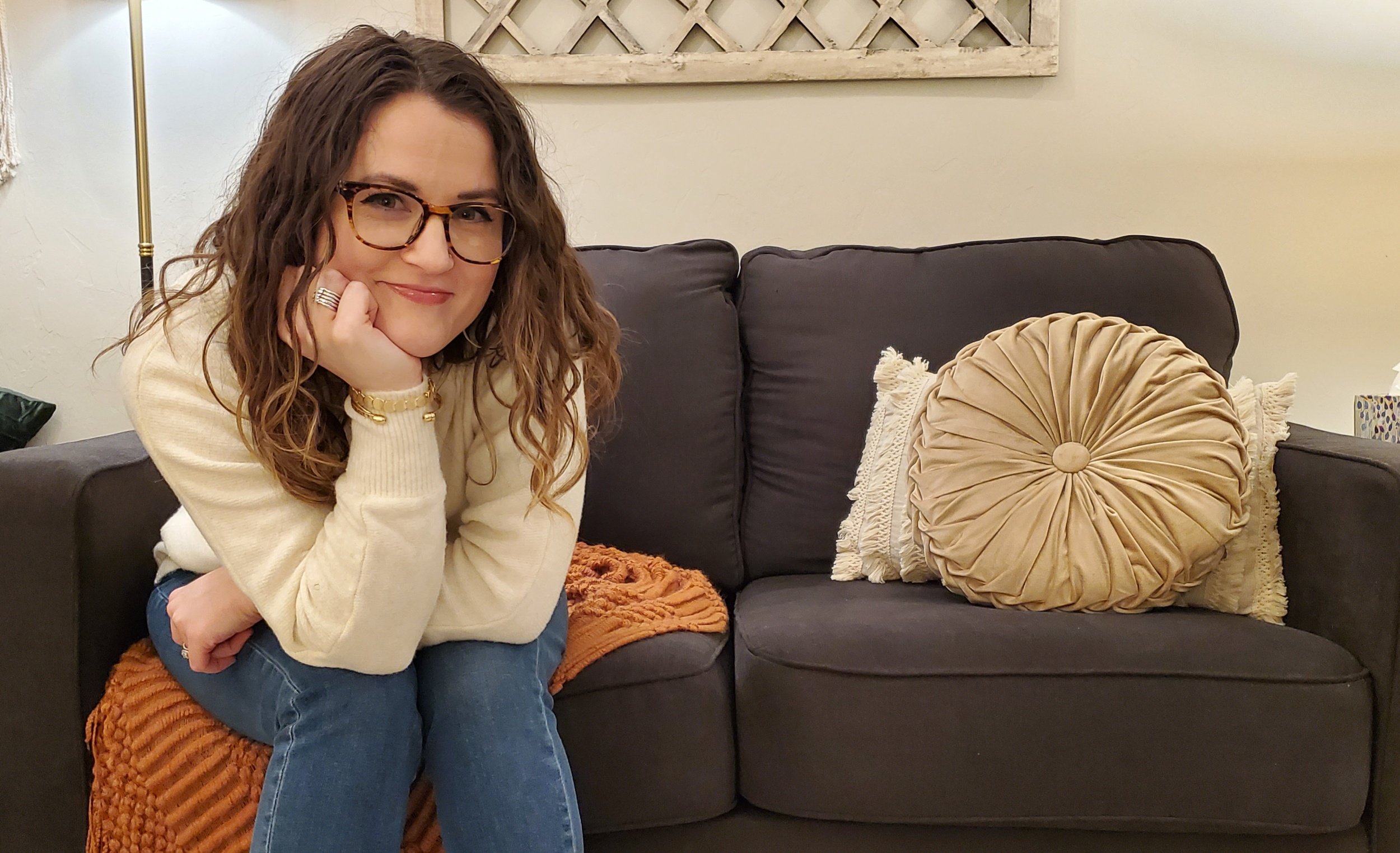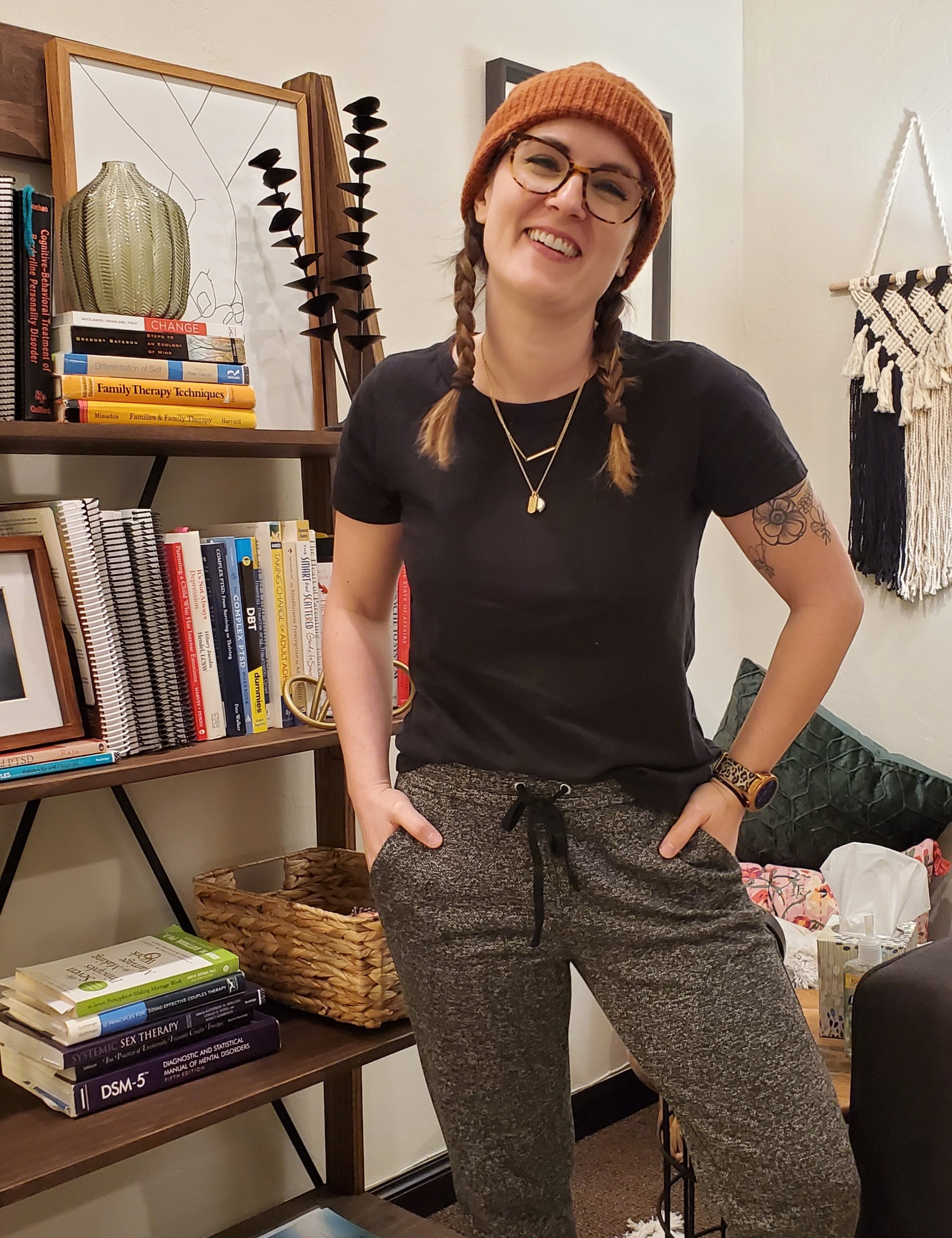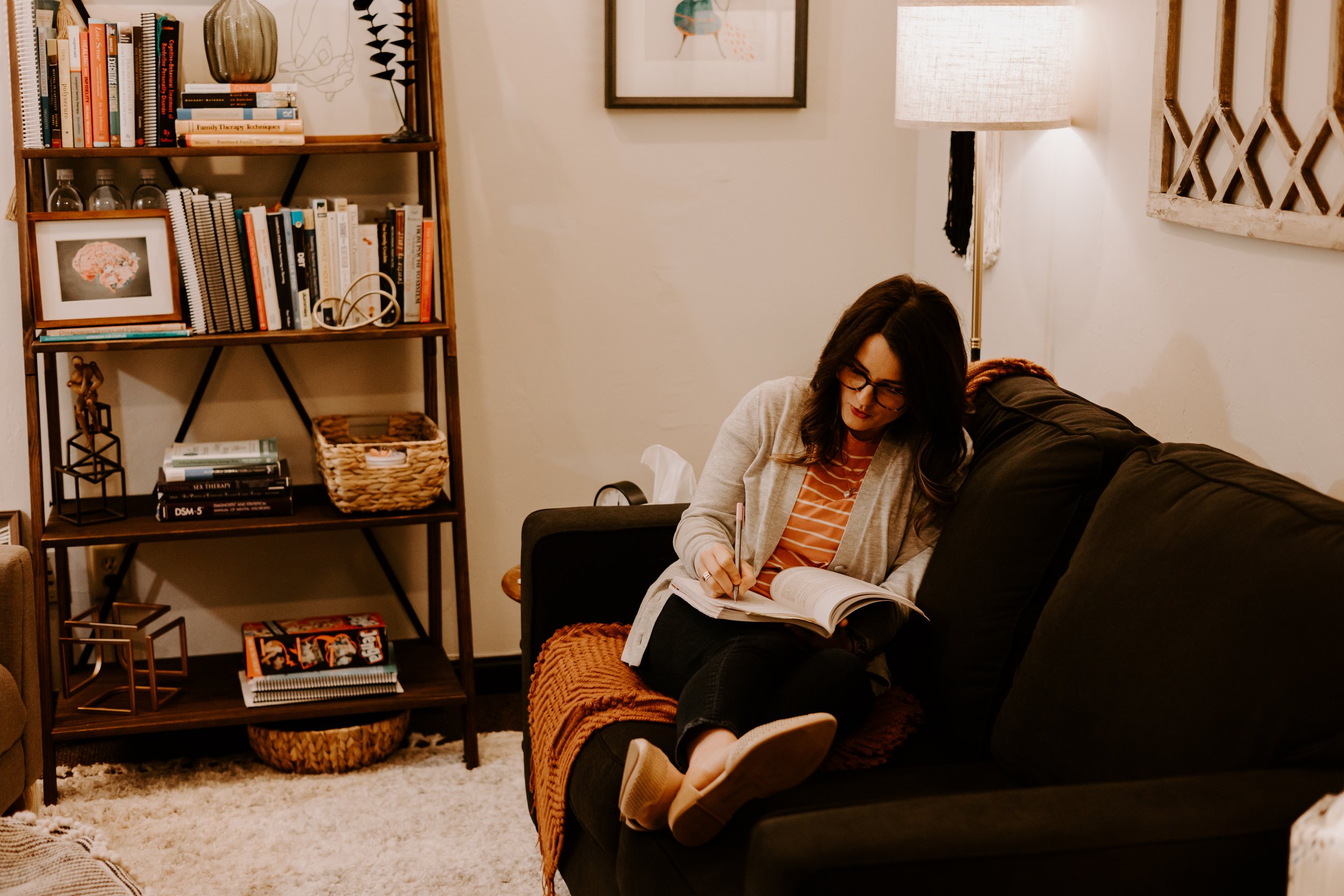
Meet Me.
Are we a good fit? You be the judge.
“I want you to get excited about who you are, what you are, what you have, and what can still be for you. I want to inspire you to see that you can go far beyond where you are right now.”
— Virginia Satir, OG family therapist and theorist
HERE’S WHAT YOU’LL GET WITH ME:
-
Collaboration
I champion collaboration and consider myself a process consultant, which means we work as teammates, but I’m often the curious one noticing and calling out the process (the meaning you make, the patterns that occur) behind the content (the words you say). We’ll sit together and discuss what brought you here as we identify and challenge ineffective patterns contributing to relational and life distress.
-
Connection
Seeking therapy is a big deal and requires vulnerability— which can feel daunting, so it’s important that you find a clinician with whom you connect. You need to feel seen, heard, safe, challenged, and supported. You’re a person—not a diagnosis, symptom, or problem— and your experience matters.
-
Empathy
Therapy isn’t meant to be experienced alone. Setting aside my personal views, I try to enter your world and feel with you, laugh with you, cry with you, celebrate with you, stand in the fire with you, and push you towards growth without losing my balance. You won’t have to walk the journey alone.
My Background
-
Oklahoma State Board of Behavioral Health – Licensed Marital and Family Therapist #1173 (2015)
National University - Doctor of Philosophy in Marriage and Family Therapy (ABD), emphasis in education and supervision (2026)
University of Central Oklahoma – Master of Science in Marital and Family Therapy (2013)
Practicum Experience: University of Oklahoma Health Sciences Center – Child Study Center, A Better Chance Clinic, Center for Child Abuse and Neglect. Extensive training in Parent-Child Interaction Therapy, studying under Dr. Beverly Funderburk, Dr. Melanie Nelson, and Vicki Cook.
Honors: Cum Laude, Delta Kappa International MFT Honor Society, President’s Honor Roll, National Scholars Honor Society, Phi Upsilon Omicron Honor Society, National Council on Family Relations Honor Student, UCO Outstanding Graduate Student Nominee
Member of the International Center for Excellence in Emotionally Focused Therapy (ICEEFT)
American Association for Marriage and Family Therapy (AAMFT) Clinical Fellow
American Family Therapy Academy (AFTA) active member and volunteer
-
Emotionally Focused Individual Therapy (EFIT) - Level 1 training with Dr. Sue Johnson and Dr. Leanne Campbell through Vancouver Island EFT.
Emotionally Focused Individual Therapy (EFIT) - Level 2 training with Dr. Laurie Brubacher through Winnipeg EFT Training & Consulting.
Emotionally Focused Couples Therapy (EFT/EFCT) – Externship with Dr. Veronica Kallos-Lilly and Murray Armstrong through Vancouver Couple & Family Institute.
Emotionally Focused Couples Therapy (EFT/EFCT) Advanced Core Skills Training with Gail Palmer, Robin Williams Blake, and Murray Armstrong through EFT Edmonton.
Emotion-Focused Family Therapy (EFFT) with Dr. Adele Lafrance and Natasha Files through Mental Health Foundations Canada.
Intensive Parent-Child Interaction Therapy (PCIT) training with Dr. Beverly Funderburk, Dr. Melanie Nelson, Vicki Cook, and Amanda Pollock at OUHSC Child Study Center.
Extensive training and experience in Dialectical Behavior Therapy (DBT) and DBT Skills
Mindfulness meditation in clinical settings. Live, virtual trainings with Tara Brach, Jack Kornfield, Kristin Neff, Suzan Salzburg, Thich Nhat Hanh, and Jon Kabat-Zinn. Additional meditation training from Buddha Mind Monastery in Oklahoma.
Parent Management Training (PMT) including workshop facilitation and curriculum development.
Trauma-Focused Cognitive Behavior Therapy (TF-CBT) training through OUHSC.
AAMFT Supervisor Designation training through AAMFT.
-
Relational distress in romantic relationships
Difficulties with adjustment / life transitions
Personal growth
ADHD / executive functioning differences / Neurodivergence / Low support needs Autism
Birth trauma
Complex trauma / C-PTSD / Developmental trauma
Religious trauma
Mood dysregulation
Emotion dysregulation / Borderline Personality Disorder / Borderline traits / Self-injurious behavior
Parenting distress / “Mom Rage”
Attachment
Dysautonomia and its mental toll
Human first.
Therapist second.
I married my best friend and we have two super cool kiddos who love soccer and Lego.
Brunch and tacos are the best foods.
Murderino. Team Oxford comma. Team toilet paper faces out. Ear rumbler. Curly Girl. Bookish. Spoonie.
Creating is my main hobby. I mostly paint, but I’ve been known to write and dabble in many crafty activities at some point. Those things haunt a large section of my closet.
I love reading historical fiction, ancient history, fantasy, and therapy-related material— but I don’t particularly like self-help books.
I’m neurodivergent, have had my share of mental health issues, have experienced trauma, and I am always working on myself.
I try to avoid the outdoors as much as possible. I love nature and don’t consider myself fussy by any means, but I’d rather be inside.
I enjoying watching Olympic swimming, gymnastics, and ice skating, but I’m no sports fan. I randomly received floor-seat tickets to a Thunder game while I was in grad school and asked my husband if it’d be weird to bring my textbook and notes to study for an exam, so…
“You have a wonderful, therapeutic way of putting people at ease. Everything about you is warm and kind and inviting.”
— Pam, previous supervisor
FAQs
-
Absolutely! I value this early connection so we can determine if we vibe. It’s helpful when I can get a sense of where you’re at and how I can help.
If I’m not a good match (perhaps we don’t vibe or I know someone better suited to help you with the struggle), I’ll help you get in touch with one of my colleagues.
-
I have been practicing since 2013. I was under supervision (like a medical resident) until 2015 when I received my license.
-
Niche life is not for me (I’ll die on this hill!). I specialize in a small handful of things (EFT/EFIT, DBT, and PMT), but I have extensive training and experience in them.
I will say, though, most of the people I work with are somehow impacted by borderline personality traits, emotion dysregulation, neurodivergence, and/or self-harm or suicidality. Sometimes I work with an entire family, sometimes it’s the couple relationship that comes to me, or often it’s the individual person themselves.
-
The therapeutic process is different for everyone so this question is difficult to answer. However, therapy addresses the struggles that pushed you to contact someone like me and helps you transcend the stuck places. Your goals are my goals and we’ll achieve them together.
Common ways I’ve seen therapy help people include: reducing suicidal thoughts, improving communication, implementing mindfulness practices, learning to self-soothe and regulate emotions, establish systems for neurodivergence, reduce conflict in families and couples, and so much more.
-
Anything you’d like! The catch is that it’s my job to sleuth for patterns and connect those things to your overall goals.
DBT has a strong emphasis on your goals and implementing DBT skills, in addition to whatever you bring that day.
EFT for couples can also be a bit more structured and focuses more on the dynamics (process) happening within the relationship, as opposed to the actual things being said (content).
-
Nope. Therapy is about processing experiences, gaining skills, working through, challenging unhelpful thoughts and behaviors, and much more. Besides, I’m no expert in your life and I don’t fancy patriarchal psychology.
On second thought, I have briefly shared my trick to nailing liquid eye liner wings. So there’s that…
-
You don’t have to be in crisis to pursue therapy. It’s normal to experience a struggle with transitions, adjustments, growing pains, or just about anything else. Many folks visit my office stating, “I just needed someone to talk to who isn’t my friend/parent/sibling.”
-
You just kind of know. You feel heard and validated, understood and valued, comfortable and accepted. Things feel right.
And if things don’t feel right, let’s talk about it and I can help you find someone you vibe with.
-
If I see you in public I will completely ignore you unless you approach me first. You are under no obligation to greet me, approach me, or chat with me in public.
I never want to put you in a position where you feel like you have to disclose who I am or how you know me to another person.
-
Yes, our sessions are confidential. I am bound by the law and an ethical code to maintain and protect confidentiality.
If I need to consult a colleague about you or something about your situation, I will discuss this with you beforehand. Additionally, I do not disclose any identifying information during the consultation and I typically change details (like your age, gender, etc.).
The only time I am allowed to break confidentiality is if you are a danger to yourself or others, if child or elder abuse is disclosed, or if a judge orders me to do so.
You can find more detailed information about this in my consent forms and I’m happy to discuss whatever concerns you may have.
-
Once an appointment is set, I will email you an invitation to the Client Portal. There you will find everything you need to get started. It’s important that this is completed before your appointment begins.
-
Follow this link to review the instructions.
-
My current office building is nestled within a professional office park. My neighbors are mainly attorneys, financial professionals, and physicians. The waiting room is cozy and fairly hidden from anyone passing through the hall. My individual office is completely private. There are sound machines to drown out noise both from inside and outside my office.
-
No, I am not qualified to prescribe medication. If you are interested in psychopharmacological treatment, consider meeting with a psychiatrist.
-
Initial sessions are typically scheduled over the phone (give me a ring here: 405.896.9216), but some are initiated through email (hit me up here: samantha@sclmft.com).
If we have an established working relationship, we’ll either schedule your next session at the time of your current session or we’ll connect later to set something up.
If you have consented to receiving text messages, my EHR system will send you an appointment reminder a couple of days beforehand. You can confirm or cancel the appointment from the reminder text. It’s super easy!
Please let me know as soon as possible if you are unable to attend your scheduled session. To avoid a no show/late cancellation fee, please give me a 48-hour notice before your appointment time.
-
At this time I accept HealthChoice insurance and private pay.
I use Square (Visa, MasterCard, American Express, Discover, JCB, or UnionPay) to accept payments. Cash and checks are also acceptable.
Payments are due at the time of service. Any unpaid balance after 90 days may be sent for collections.
-
My standard rates are:
Initial intake … $200
Couples therapy … $200/hr
Individual therapy … $175/hr
Family therapy … $200/hr
In an effort to make my services more accessible and equitable, I offer a pay-what-you-can (PWYC) model. You know your situation better than I do and I believe you should be the one to determine what that looks like.
-
My rate is $135 for individual sessions and $150 for couples or family sessions. What can you reasonably afford each session?
I decided to formally implement a PWYC model as an extension of my personal and professional values. People deserve more say in their care and I hope to be accessible to everyone, regardless of their privilege.
This model benefits a much wider-range of people and allows me the flexibility to help
-
No catch, but I do have some guidelines for my version of the model.
Before rates are discussed, I ask about the reasons you’re seeking help. This helps me determine if I’m a good clinical fit for you, if I can accommodate your needs in my schedule, and so on.
I only agree to work with people I feel I can of most value. For example, if you’re concerned you have a drinking problem or OCD, I’m not clinically competent in those areas and will hook you up with one of my many therapist friends who specialize in your area of need.
If my standard rate isn’t an option for you, I’ll ask you to tell me what you can reasonably afford each session.
Above all, it’s important that you and I are a good fit for each other and finances shouldn’t get in the way of that.
-
The short answer is that insurance companies, in my experience, are infuriating and difficult to work with. I’d rather set my hair on fire or attend an NFL game, neither of which are gonna happen!
The longer answer is probably better suited for a soap box. Or perhaps a blog post? Stay tuned.
We all need community and connection and I appreciate you inviting me into your circle, even if it’s temporary.
Everyone is Welcome
My pronouns are she/her/they. In an effort to undo Indigenous erasure, I’d like to acknowledge Indigenous presence and land rights and that I practice on Kickapoo, Osage, Comanche, and Kiowa land. Additionally, I want to express solidarity in addressing and challenging anti-Black violence, systemic racism, and oppressive systems.
I’m still listening and learning and speaking up when it matters most.
You’re safe here. My individual practice is supportive and affirming of: 2SLGBTQIA+, sex and sexuality, non-monogamy and BDSM/kink, your body—in all its forms, science, your pronouns, secularism/atheism/agnosticism, antiracism/racial justice, social justice, intersectional feminism, neurodivergence, and lived experiences.


